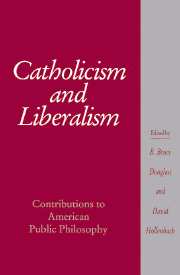Book contents
- Frontmatter
- Contents
- List of contributors
- Preface
- Introduction
- PART I HISTORICAL CONFLICTS AND DEVELOPMENTS
- 1 The failed encounter: the Catholic church and liberalism in the nineteenth century
- 2 American Catholics and liberalism, 1789–1960
- 3 Vatican II and the encounter between Catholicism and liberalism
- 4 Liberalism after the good times: the “end of history” in historical perspective
- PART II NEW ENCOUNTERS AND THEORETICAL RECONSTRUCTIONS
- PART III PRACTICES AND INSTITUTIONS
- Afterword: a community of freedom
- Index
4 - Liberalism after the good times: the “end of history” in historical perspective
Published online by Cambridge University Press: 19 February 2010
- Frontmatter
- Contents
- List of contributors
- Preface
- Introduction
- PART I HISTORICAL CONFLICTS AND DEVELOPMENTS
- 1 The failed encounter: the Catholic church and liberalism in the nineteenth century
- 2 American Catholics and liberalism, 1789–1960
- 3 Vatican II and the encounter between Catholicism and liberalism
- 4 Liberalism after the good times: the “end of history” in historical perspective
- PART II NEW ENCOUNTERS AND THEORETICAL RECONSTRUCTIONS
- PART III PRACTICES AND INSTITUTIONS
- Afterword: a community of freedom
- Index
Summary
What we may in fact be witnessing is not just the passing of a particular period of postwar history, but the endpoint of mankind's ideological evolution and the emergence of Western liberal democracy as the final form of government.
Francis FukuyamaIn culture, as well as politics, liberalism is now up against the wall.
Daniel BellThis is an essay about the future of liberalism in the light of its past. It is designed to recall some of what liberals have been through in the recent past in order to make sense of where they are now headed. And in particular it is intended to bring to light the complexity – and uncertainty – of the fate that awaits them.
This is not something, needless to say, which can be taken for granted. For now that events are turning out well for them, there is a predictable tendency on the part of liberals (as well as many others) to assume that their present success has a simple, straightforward meaning. Hence the talk we are hearing of their having “won” the great ideological competition of our time and even of “history” having come to an end in the process – all of which gives the impression that it is obvious what has taken place and where it leads. But it is not. And the more one knows of the actual history of the events in question, I would submit, the more evident it is that this is the case.
- Type
- Chapter
- Information
- Catholicism and LiberalismContributions to American Public Policy, pp. 100 - 124Publisher: Cambridge University PressPrint publication year: 1994

